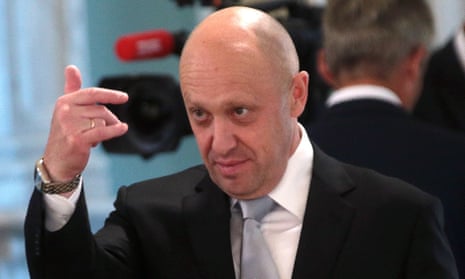Facebook has taken down accounts linked to Yevgeny Prigozhin – the businessman allegedly behind Russia’s notorious troll factory – which were actively seeking to influence the domestic politics of a range of African countries.
The company said on Wednesday it had suspended three networks of “inauthentic” Russian accounts. The Facebook pages targeted eight countries across the continent: Madagascar, the Central African Republic (CAR), Mozambique, the Democratic Republic of the Congo, Ivory Coast, Cameroon, Sudan and Libya.
All were linked to Prigozhin, a Russian tycoon close to Vladimir Putin. The US has previously indicted Prigozhin for interfering in the 2016 presidential election. It accuses him of running a global disinformation media empire and of funding the Internet Research Agency, the St Petersburg troll factory that boosted Donald Trump.
Facebook’s head of cybersecurity policy, Nathaniel Gleicher, said Russia used almost 200 fake and compromised accounts to reach more than 1 million followers in Africa. Russian-run networks worked closely with locals in order to disguise the sites’ true origins, he said.
“There’s sort of a joining of forces, if you will, between local actors and actors from Russia,” he told Reuters. “It appears that the local actors who are involved know who is behind the operation.”
In recent years the Kremlin has made considerable efforts to cultivate support from African rulers. Last week Putin held the first-ever Russia-Africa forum in the Black Sea resort of Sochi, attended by more than 40 African heads of state.
Prigozhin has led Russia’s push in Africa. Mercenaries from Wagner – a shadowy private military contractor linked to Prigozhin – have been sent to the Central African Republic. Prigozhin entities have also established media outlets in several African countries and have sent Russian “advisers” to help with elections.
Moscow’s aim appears to be to bolster existing governments and smear pro-western opposition parties. Documents seen by the Guardian earlier this year envisage grooming a new generation of African “leaders” and undercover “agents”, and pushing out former colonial powers such as France or the UK.
Facebook said one fake network was centred on Sudan, where in late 2018 Russia tried unsuccessfully to prop up President Omar al-Bashir, who was deposed in April. Another – featuring 35 accounts and 53 pages – was run out of Madagascar and Mozambique. A third was focused on Libya.
The campaigns shut down for meddling in Africa had posted about local news and geopolitical issues, as well as sharing content from local and Russian state media including Sputnik and RT. Some of the accounts were active as far back as 2014, Facebook said.
The company did not identify which accounts had been suspended. The Guardian found that the Facebook page of a French-language news service, Afrique Panorama, based in Madagascar’s capital, Antananarivo, was no longer working.
Also not working was the account for Afric, a South Africa-based website previously linked with a Russian attempt to meddle in the country’s recent election by backing the ruling African National Congress. The campaign appears to have had little impact.
Researchers at the Stanford Internet Observatory, the research lab at Stanford University, said the networks used a variety of techniques across the African countries.
Some accounts supported a specific party or candidate, they said, while others backed multiple figures. In other cases, the pages appeared geared towards building support for Wagner activities or Russian deals for gold, diamonds and other natural resources.
The takedown on Wednesday was Facebook’s second move against groups it linked to Prigozhin in a week. Last week the company said it had suspended a network of 50 Instagram accounts connected with the Internet Research Agency
Prigozhin has denied US claims he finances the troll factory and says Wagner does not exist.
